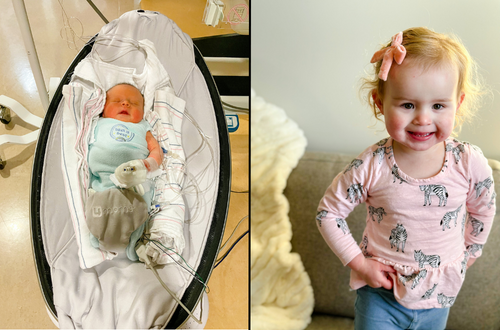
Maureen Alderman, member of the Rare Disease Advisory Council and mother of a child with a rare disease:
Rare Disease Day was a day not on our calendar three years ago. It was a day we were completely unaware of. But this February 28, it is a day we will celebrate proudly!
In November 2020, with the birth of our daughter, Caroline, we instantly joined a community we did not know existed. Caroline was diagnosed with Argininosuccinic Aciduria (ASA), a Urea Cycle Disorder, shortly after birth. It was found after a voluntary Minnesota Newborn Screening. ASA is considered a Rare Disease with a 1 in 70,000 occurrence. Although, we like to say she is one in a million.
Upon being checked into the NICU (Neonatal Intensive Care Unit) with our 2-day old baby and having facts and figures thrown at us, we heard things a parent never imagines hearing about their incredibly precious and perfect baby. We learned that Caroline was only the 5th patient that a major hospital in the Twin Cities had ever seen with her condition. We learned her prognosis could be severe, needing extensive care, or it could be minor, needing more routine care. Either way, she would need frequent labs and many doctor visits to determine the level of treatment she would need.
Our very sweet daughter’s future was incredibly unknown. With her diagnosis being so rare there were very few resources or tools we were given to understand her condition. So began our journey into Rare Diseases. On what felt like an island.
Hearing the diagnosis of a rare disease is an incredibly isolating feeling. While we had incredible support from family and friends, we had no one that even knew what a rare disease was, let alone a urea cycle disorder. We had a million questions and no answers: Why is our sweet baby the one with a rare condition? Why is there so little information available? As parents, my husband, Adam, and I, wanted to give our darling daughter the best care possible but struggled to find it initially. After multiple second opinions and Google searches, we found a care team that is beyond exceptional. However, that search took precious months while she received mediocre care. Something kept repeating in my head while we went through this search: “Why is this so challenging? Why isn’t there better access to find the best care within reach for these patients?”
While not as common as other health diagnoses, it does not mean there should be no general awareness for these types of rare conditions. I believe: These patients are people, and they are exceptional. They shouldn’t be alone. They deserve recognition and support.
The diagnosis of a rare disease can come in many forms and across many time periods. We were beyond fortunate to have Caroline’s diagnosis discovered at birth. This allowed us to seek immediate medical treatment. Without detection at birth with the Newborn Screen, she may have had significant life-altering issues or—as scary as it is to say—may not be here with us today. Rare disease detection at birth is not typically the case for many patients. As we have learned, the diagnosis of one of the over 7,000 rare disease conditions can be untimely and come at the expense of the health of the patient. Symptoms may present in many different ways.
The complexities in Rare Disease—from diagnosis, treatment options, and long-term care—are different for every patient. However, finding a community that advocates for early diagnosis, effective treatment options, and, most importantly, a group of people that understand what you are going through is invaluable.
In November 2020, knowing such an incredible group of people across the Rare Disease space existed would have given us the slightest peace of mind that we had a community to lean on. But we did not. For two years, we met new doctors and members of the Rare community who gave us comfort and pride. We discovered the Minnesota Rare Disease Advisory Council and the National Organization for Rare Diseases. We met other families with children with ASA so Caroline would have friends in the same situation. And through this journey, we have found the most incredible network of people.
We are no longer on the island we found ourselves on after Caroline’s diagnosis. Every person we have met has impacted our sweet girl’s life. As my husband and I turned over every rock we could find. Each person led us to getting Caroline and our entire family the incredible support and help we needed. Caroline is thriving while living with a rare disease and it is all because of this community we have behind us.
So, as we pause to celebrate and reflect on Rare Disease Day, I hope we can continue to raise awareness allowing people just diagnosed with a Rare Disease one less thing to worry about. These health conditions may be considered rare, but it does not mean you are alone. The Rare Disease world is not one that can take on alone.
On February 28, we are so excited to celebrate Rare Disease Day. A day to reflect on what these patients have overcome. A day of gratitude for every doctor, physician assistant, nurse, lab tech, and medical professional that has touched the lives and futures of Rare Disease patients. A day to celebrate the research and developments going on in the Rare Disease community to create further treatment options. And maybe most importantly, a day of awareness for those not immediately impacted by Rare Disease.
So please take a minute to add February 28 to your calendar and celebrate some of the rarest and most exceptional people I have ever encountered.
More Information
Watch the segment Affordable and Accessible Housing from the 2023 MCD Legislative Form.
Visit our bill tracking page to learn more about rare disease bills like HF 0384.